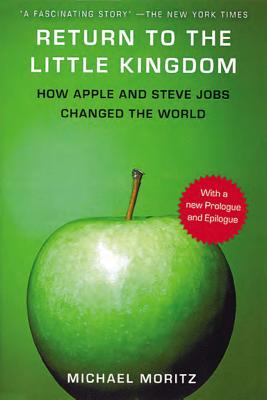I typed my first high school papers, my first non-hand-written stories, on an electric typewriter--a hand-me-down from a cousin--on the floor of my childhood bedroom. But when I got to college, there was a bank of Apple IIe computers in the dorm's lab and over the years I often spent all night in the company of those small white boxes, a happy computer face greeting me each time I came back from the cafeteria full and ready to settle back down to the grind of churning out the multitude of 10-20 page papers required for every class every term. Entering grad school, I bought a Macintosh Performa so that I could write my stories and more of those papers at my apartment while eating ramen noodles. Now I do my work at work on a shiny black MacBook Pro, and my work at home on a smaller MacBook White. I've got an iPod to take with me to the gym, though no iPhone. My 6-year-old has an iPad, an early convert to the cult of Apple, because the touch screen gets his little fingers computing. It's an obvious observation that some brands, in this case Apple, are woven into our lives, but it is an interesting exercise to look at just how integrated a brand is in how we live and do our work. Clearly in my case, Apple has been a sort of partner to me in all my academic (and entertainment) pursuits.
It's often hard to determine what Apple is more famous for: it's apple icon, or it's Apple icon, Steve Jobs. And that glowing apple on the open covers of the laptops that dot the tops of cafe tables at the neighborhood coffee shop certainly says something about the users and is a little beacon that connects Apple user to Apple user. That icon
is Apple's aesthetic and there has certainly been a lot written about the how's and the why's of the design choices Apple makes. But you need only do a search for Steve Jobs in our book database to see an equally lengthy list of books by authors who try to capture on paper the essence of Steve Jobs and how that essence influenced Apple.
Perhaps your average Joe with the ubiquitous white earphones tucked into his ears doesn't so much care about who (with Steve Wozniak) created the company, left it, returned, then resurrected and redirected it, about who put the "i" in iPod, iTunes, iTouch, iPad. But in business or even cocktail conversation, Steve Jobs is the "it" guy. (All iT and IT puns intended.) At this point in his career, his strategy, his resurgence, his presentation style, his management style, everything about Steve Jobs is a curiosity, nothing less than a phenomenon. Sure, he has his detractors, but his admirers outweigh the naysayers handily. Particularly now. Because Wednesday Steve Jobs resigned from Apple.
Many of the write-ups about Jobs' resignation have a tinge of the obituary to them. Which of course is the case whenever a well-known leader steps down. But most often, there is the compulsory speculation about what that person will do next. Not so with Steve Jobs. His health is commonly believed to be the reason he is stepping down, and we all know that Steve Jobs' is facing an staunch opponent. He has been open about his cancer and subsequent treatment over the years. Yet there are plenty of articles and conversations wondering about whether Job's resignation also equals the eventual demise of Apple. Or at the very least, its decline. Jobs came back to Apple at a time when it was being pummeled in the marketplace and leaking money and he implemented a structure and a design aesthetic that changed all of technology and beyond. So without Jobs, will Apple falter again? Impossible to say, even for those pundits and prognosticators on CNBC and whatnot with their data-crunching. But Jobs' legacy and the state of his company
are tightly intertwined and so the scrutiny is understandable, but maybe because Apple products are so integrated into our lives, we as consumers will keep the brand aloft.
As is evident in the
collected quotes that the
Wall Street Journal compiled, Jobs is a thoughtful, quotable man, who earlier was quite pugilistic in his speech and now is quite Zen-like in his philosophy. Perhaps people--reporters, bloggers, thinkers, innovators--simply are mourning the loss of that prominent voice that brought to the table or the podium a spark and often hit a nerve. That is what Seth Godin paid homage to so well yesterday
in his post about Jobs. Economical and accurate as ever, Seth already feels the absence of Steve Jobs' voice in the business wilderness. There are and will be other insightful and engaging personalities to fascinate us, but Steve Jobs' resignation reminds us of how, as business thinkers, we get inspired by the inspired.
Thankfully there is a biography of Jobs by
acclaimed biographer Walter Isaacson still coming out in November. And if all this talk about Steve Jobs is making you wonder what he is about, then check out some of these books in the meantime.

















